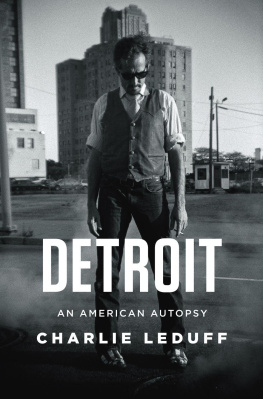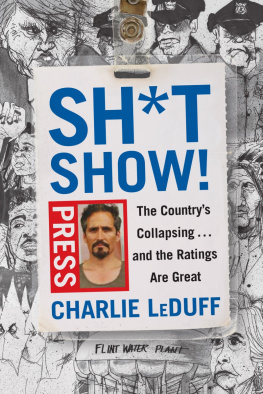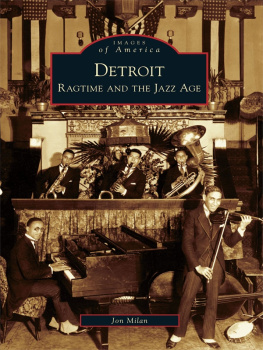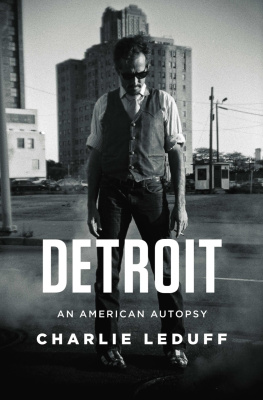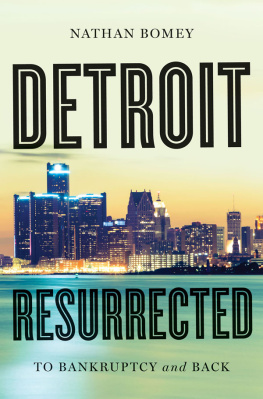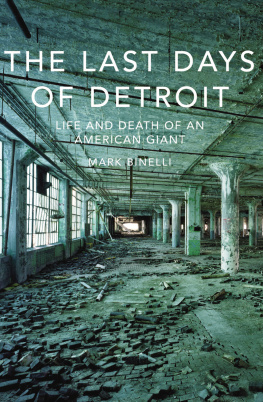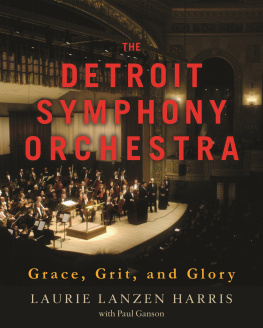A LSO BY C HARLIE L E D UFF
US Guys
Work and Other Sins
DETROIT
AN AMERICAN AUTOPSY
CHARLIE LEDUFF
THE PENGUIN PRESS
NEW YORK
2013
THE PENGUIN PRESS
Published by the Penguin Group
Penguin Group (USA) Inc., 375 Hudson Street New York, New York 10014, U.S.A. Penguin Group (Canada), 90 Eglinton Avenue East, Suite 700, Toronto, Ontario, Canada M4P 2Y3 (a division of Pearson Penguin Canada Inc.) Penguin Books Ltd, 80 Strand, London WC2R 0RL, England Penguin Ireland, 25 St Stephens Green, Dublin 2, Ireland (a division of Penguin Books Ltd) Penguin Group (Australia), 707 Collins Street, Melbourne, Victoria 3008, Australia (a division of Pearson Australia Group Pty Ltd) Penguin Books India Pvt Ltd, 11 Community Centre, Panchsheel Park, New Delhi 110 017, India Penguin Group (NZ), 67 Apollo Drive, Rosedale, Auckland 0632, New Zealand (a division of Pearson New Zealand Ltd) Penguin Books (South Africa), Rosebank Office Park, 181 Jan Smuts Avenue, Parktown North 2193, South Africa Penguin China, B7 Jiaming Center, 27 East Third Ring Road North, Chaoyang District, Beijing 100020, China
Penguin Books Ltd, Registered Offices:
80 Strand, London WC2R 0RL, England
First published in 2013 by The Penguin Press,
a member of Penguin Group (USA) Inc.
Copyright Charles LeDuff, 2013
All rights reserved
Evidence Detroit, photographs by Danny Wilcox Frazier
Library of Congress Cataloging-in-Publication Data
LeDuff, Charlie.
Detroit : an American autopsy / Charlie LeDuff.
p. cm.
ISBN 978-1-59420-534-7
eBook ISBN 978-1-101-60588-2
1. Detroit (Mich.)Economic conditions. 2. Detroit (Mich.)Social conditions. 3. Detroit (Mich.) Politics and government. 4. LeDuff, Charlie. 5. JournalistsMichiganDetroitBiography. I. Title.
HC108.D6L44 2013
977.4'34044dc23
2012030924
Book Design by Claire Naylon Vaccaro
No part of this book may be reproduced, scanned, or distributed in any printed or electronic form without permission. Please do not participate in or encourage piracy of copyrighted materials in violation of the authors rights. Purchase only authorized editions.
Penguin is committed to publishing works of quality and integrity. In that spirit, we are proud to offer this book to our readers; however, the story, the experiences, and the words are the authors alone.
For Amy and Claudette
Detroit turned out to be heaven,
but it also turned out to be hell.
M ARVIN G AYE
CONTENTS
A CKNOWLEDGMENTS
Corn does not grow alone. And books do not write themselves. Id like to give thanks to the people of Detroit, Michigan, U.S.A.especially those who shared their stories here. You are a proud nation.
My mother, Evangeline, who taught me my first words, told me our family stories and showed me how to write my name. You are the rock.
My brothers Jim, Frank and Bill. Without you, I would have grown up a weakling.
My wife, Amy, who endures the journeyboth high and low. Thanks for holding my hand, baby.
Some material in this book appeared in different form in both the Detroit News and Mother Jones magazine. My gratitude to Jon Wolman, publisher and editor of the News , as well as Gary Miles and Walter Middlebrook, for bringing me home.
My colleagues at the News especially Max Ortiz and Elizabeth Conley for their photographic eyes and friendship on all those cold nights. Bob Houlihan, Paul Egan, Joel Kurth, George Hunter, Doug Guthrie and Laura Bermanfor their generosity and outlook .
Clara Jeffery at Mother Jones : thank you for helping me see it.
Scott Burgess wrote for me a long description of the goings-on at the Los Angeles Auto Show, much of which is quoted here. My appreciation for the assist and the insight.
Todd Schindler provided a keen eye and solid shoulder when things got tough. Bob Paris came up with the title for the book.
Sloan Harris and Ann Godoff. Without their strong arms, this boat would have sunk.
Danny Frazier. Remember what the sign says: Stay Inn.
Thanks to the Mongo brothers: Adolph, Larry and Skip. Your pool runs deep.
The men and women of the Detroit Police Department, especially Mike Carlisle, Tony Wright and Mike Martel, and all those in blue whose names I cannot print. You know why. Respect.
The men and women of the Detroit Fire Department: Mike Nevin, Wisam Zeineh and the crazy sons of bitches who do the job because the jobs got to be done.
Every teacher who helps and every honest politician who serves.
Claudette: remember where you come from, girl. Sometime in her life a bird needs to circle home.
P ROLOGUE
I REACHED DOWN the pant cuff with the eraser end of my pencil and poked it. Frozen solid. But definitely human.
Goddamn.
I took a deep breath through my cigarette. I didnt want to use my nose. It was late January, the air scorching cold. The snow was falling sideways as it usually did in Detroit this time of year. The dead man was encased in at least four feet of ice at the bottom of a defunct elevator shaft in an abandoned building. But still, there was no telling what the stink might be like.
I couldnt make out his face. The only things protruding above the ice were the feet, dressed in some white sweat socks and a pair of black gym shoes. I could see the hem of his jacket below the surface. The rest of him tapered off into the void.
In most cities, a death scene like this would be considered remarkable, mind-blowing, horrifying. But not here. Something had happened in Detroit while I was away.
* * *
I had left the city two decades earlier to try to make a life for myself that didnt involve a slow death working in a chemical factory or a liquor store. Any place but those places.
But where? I wandered for years, working my way across Asia, Europe, the Arctic edge working as a cannery hand, a carpenter, a drifter. And then I settled into the most natural thing for a man with no real talents.
Journalism.
It required no expertise, no family connections and no social graces. Furthermore, it seemed to be the only job that paid you to travel, excluding a door-to-door Bible salesman. Nearly thirty years old, I went back to school to study the inverted pyramid of writing. I landed my first newspaper job with the Alaska Fishermans Journal, where I wrote dispatches in longhand on legal pads and mailed them back to headquarters in Seattle.
So I went out into the Last Frontier with my notepad and a tent and wrote what I saw: stuff about struggling fishermen, a mountain woman who drank too much and dried her panties on a line stretched across the bow of her boat, Mexican laborers forced to live in the swamps, a prince who lived under a bridge, a gay piano man on a fancy cruise liner. People managing somehow. My kind of people. The job suited me.
Working off that, I tried to land a real job but couldnt find one. The Detroit Free Press didnt want me. Not the San Francisco Chronicle . Not the Oakland Tribune . I was thinking about returning to the Alaskan fishing boats until a little Podunk paper called me with an offer of a summer internshipthe New York Times .
Luck counts too.
I ended up working at the Gray Lady for a decade, sketching the lives of hustlers and working stiffs and firemen at Ground Zero. It was a good run. But wanderlust is like a pretty girlyou wake up one morning, find shes grown old and decide that either youre going to commit your life or youre going to walk away. I walked away, and as it happens in life, I circled home, taking a job with the Detroit News . My colleagues in New York laughed. The paper was on death watch. And so was the city.
It is important to note that, growing up in Detroit and its suburbs, I can honestly say it was never that good in the first place. People of older generations like to tell me about the swell old days of soda fountains and shopping stores and lazy Saturday night drives. But the fact is Detroit was dying forty years ago when the Japanese began to figure out how to make a better car. The whole country knew the city and the region was on the skids, and the whole country laughed at us. A bunch of lazy, uneducated blue-collar incompetents. The Rust Belt. The Rust Bowl. Forget about it. Florida was calling.
Next page
